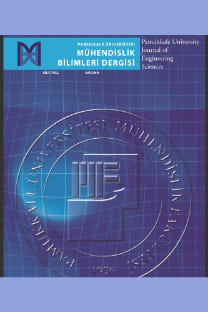Alan Modelinin Politika Kullanılarak Kişiselleştirilmesi
Kişiselleştirme, Kullanıcı modelleme, Profil
Personalizing Domain Model by Using Policy
-,
___
- Object
- http://www.omg.org/spec/MOF/2.4.1/ (26 Ekim 2015). Facility (MOF). [2] Brickley D,
- Friend-of-A-Friend (FOAF).
- https://www.foaf-project.org (20 Ocak 2014). [3] Kagal L, Finin T, Joshi A. “A Policy Language for a
- Pervasive Computing Environment”. In IEEE 4th
- International Workshop on Policies for Distributed Systems
- and Networks, 63-74. 4-6 June, 2003. [4] Protégé Ontoloji Editörü. http://protege.stanford.edu/
- (20 Ocak 2014). [5] FatSecret, Calories Nutrition All Things about food and diet.
- (20 Ocak 2014). [6] SPARQL Query Language for RDF. Ocak
- https://www.w3.org/TR/rdf-sparql-query 2014). (20 [7] Ameen A, Ur Rahman Khan K, Rani BP. “Semantic Web
- Personalization: A Survey”. Information and Knowledge
- Management, 2(6), 95-105, 2012. [8] Baldoni M, Baroglio C, Henze N. “Personalization for the
- Semantic Web”. In Proceedings of the First International
- Conference on Reasoning Web (REWERSE 2005),
- LNCS, (3564), 173-212, 2005. [9] Durao F, Dolog P, Jahn K. “State of the Art:
- Personalization”. Knowledge in a Wiki Project, 2008. [10] Chen H, Perich F, Chakraborty D, Finin T, Joshi A.
- “Intelligent Agents Meet Semantic Web in a Smart
- Meeting Room”. In Proceedings of the 3rd International
- Joint Conference on Autonomous Agents and Multiagent
- Systems (AAMAS 2004), Washington DC, USA, 2004. [11] Middleton SE, Shadbolt NR, De Roure DC. “Ontological
- User Profiling in Recommender Systems”. ACM
- Transactions on Information Systems, 22(1), 54-88, 2004. [12] Leung KWT, Lee DL, Lee Wang-Chien, “Personalized Web
- Search with Location Preferences”. IEEE 26th International
- Conference on Data Engineering (ICDE), Long Beach
- California, USA. 1-6 March 2010. [13] Skillen KL, Chen L, Nugent CD, Donnelly MP, Burns W,
- Solheim I. “Ontological User Profile Modeling for Context- Aware
- Proceedings of the 6th International Conference on
- Ubiquitous Computing and Ambient Intelligence, Vitoria
- Gasteiz, Spain, 3-5 December 2012. UCAmI'12 [14] Tapucu D, Can O, Bursa O, Unalir MO. “Metamodeling
- Approach to Preference Management in the Semantic
- Web”. 4th Multidisciplinary Workshop on Advances in
- Preference Handling (M-PREF 2008) (In conjunction with
- AAAI 2008), Chicago, Illinois, USA, 13-14 July 2008. [15] Royer JC, Willrich R, Diaz M. “User Profile-Based
- Authorization Policies for Network QoS Services”.
- Seventh IEEE International Symposium on Network
- Computing and Applications, Cambridge, Massachusetts,
- USA, 10-12 July 2008. [16] Iqbal Z, Noll J. “Toward User-Centric Privacy-Aware User
- Profile Ontology for Future Services”. Third International
- Conference on Communication Theory, Reliability, and
- Quality of Service (CTRQ), Athens, TBD, Greece,
- 13-19 June 2010. [17] Agostini A, Bettini C, Cesa-Bianchi N, Maggiorini D, Riboni
- D. “Integrated Profile and Policy Management for Mobile
- Oriented Internet Services”. Technical Report Firb-Web
- Minds N. TR-WEBMINDS-04, Milan, Italy, 2003. [18] Can O, Bursa O, Unalir MO. “Personalizable Ontology
- Based Access Control”. Gazi University Journal of Science,
- 23(4), 465-474, 2010, [19] Uszok A, Bradshaw JM, Jeffers R. “KAoS: A Policy and
- Domain Services Framework for Grid Computing and
- Semantic Web Services”. In Trust Management
- (iTrust 2004), Volume 2995 of Lecture Notes in Computer
- Science, Oxford, UK, 29 March-1 April, 2004. [20] Dulay N, Lupu E, Sloman M, Damianou N.
- “A Policy Deployment Model for the Ponder Language”.
- In Proceedings of IEEE/IFIP International Symposium on
- Integrated Network Management (IM 2001), UK, May 2001. [21] Tonti G, Bradshaw JM, Jeffers R, Montanari R, Suri N,
- Uszok A. “Semantic Web Languages for Policy
- Representation and Reasoning: A Comparison of KAoS,
- Rei, and Ponder”. International Semantic Web Conference, Florida,
- 20-23 October 2013. USA, [22] Lasierra N, Alesanco A, Guillen S, Garcia J. “A Three Stage
- Ontology-Driven Solution to Provide Personalized Care to
- Chronic Patients at Home”. Journal of Biomedical
- Informatics, 46(3), 516-529, 2013. [23] Ueda M, Takahata M, Nakajima S. “User’s Food Preference Extraction for
- Recommendation”. 2nd International Workshop on Semantic
- Retrieval and Recommendation SPIM, Bonn, Germany, 23
- 24 October 2011. Cooking Recipe Personalized Information Management: [24] Hella L, Krogstie J. “Personalisation by Semantic Web
- Technology in Food Shopping”. In Proceedings of the
- International Conference on Web Intelligence, Mining and
- Semantics (WIMS’11), Sogndal, Norway, May 25-27, 2011. [25] Can Ö. Anlamsal Web İçin Kişiselleştirilebilir Ontoloji
- Tabanlı Erişim Denetimi ve Politika Yönetimi.
- Doktora Tezi, Ege Üniversitesi, İzmir, Türkiye, 2009. [26] Can Ö, Sezer E, Bursa O, Ünalır MO. “Personalized
- Vaccination using Ontology Based Profiling”. 7th Metadata
- and Semantics Research Conference (MTSR 2013), CCIS
- 390, Thessaloniki, Greece, 19-22 November 2013. [27] Snae C, Brückner, M. “FOODS: A Food-Oriented Ontology
- Driven System”. 2nd IEEE International Conference on
- Digital Ecosystems and Technologies (DEST 2008),
- Phitsanulok, 26-29 February 2008. [28] Cantais J, Dominguez D. Gigante V, Laera L, Tamma V.
- “An Example of Food Ontology for Diabetes Control”.
- Proceedings of the International Semantic Web Conference
- 2005 Workshop on Ontology Patterns for the Semantic
- Web”, Galvay, Ireland, 7 November 2005. Ek A yer Makale http://semanticweb.ege.edu.tr/ontology ulaşılabilmektedir. alan ontolojilere adresinden
- ISSN: 1300-7009
- Yayın Aralığı: 7
- Başlangıç: 1995
- Yayıncı: PAMUKKALE ÜNİVERSİTESİ
Trafik Duyarlı Kablosuz Vücut Alan Ağlarının Başarım Analizi
Sosyal Ağlar üzerinde Ontoloji Tabanlı Sezgi Analizi için Bir Uygulama Çerçevesinin Geliştirilmesi
Kadir TUTAR, Murat ÜNALIR, Levent TOKER
Web Tabanlı Uzaktan Eğitim için Çevrimiçi Veritabanı Editörü Tasarımı
Alan Modelinin Politika Kullanılarak Kişiselleştirilmesi
Özgü CAN, Okan BURSA, Murat ÜNALI
Görüntü İşleme ve Beş Eksenli Robot Kol ile Üretim Bandında Nesne Denetimi
Görüntü Eşleme ve Genetik Algoritmalar Kullanarak Görüntü içinde Görüntü Arama
